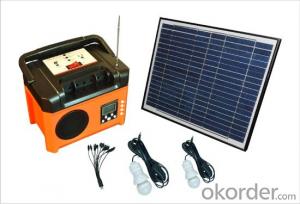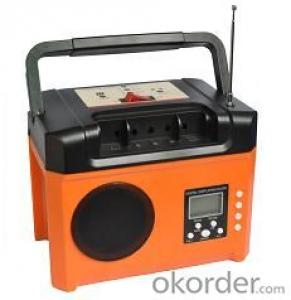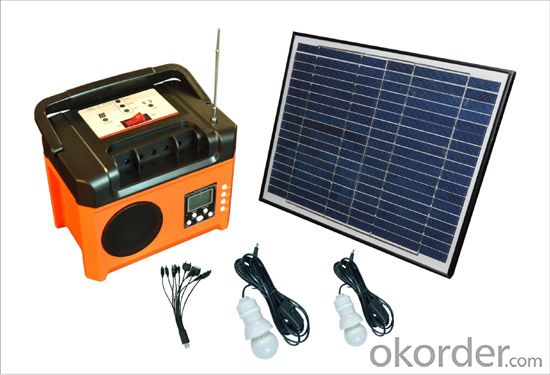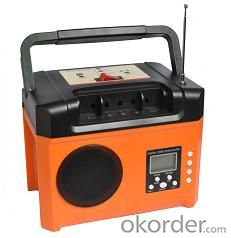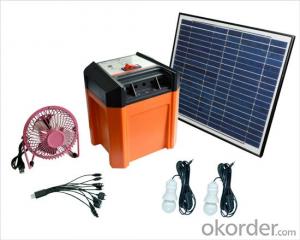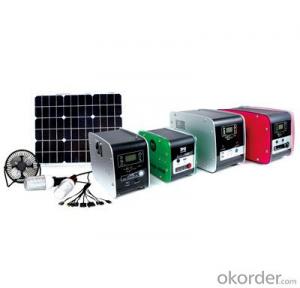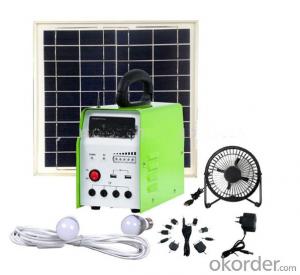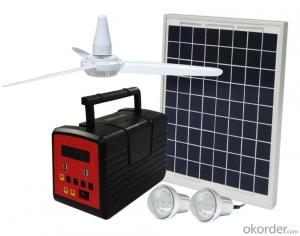Solaron Solar Energy Systems - Solar Power System with FM Radio, Built-in Battery, and USB
- Loading Port:
- Shekou
- Payment Terms:
- TT OR LC
- Min Order Qty:
- 50 unit
- Supply Capability:
- 5000 unit/month
OKorder Service Pledge
OKorder Financial Service
You Might Also Like
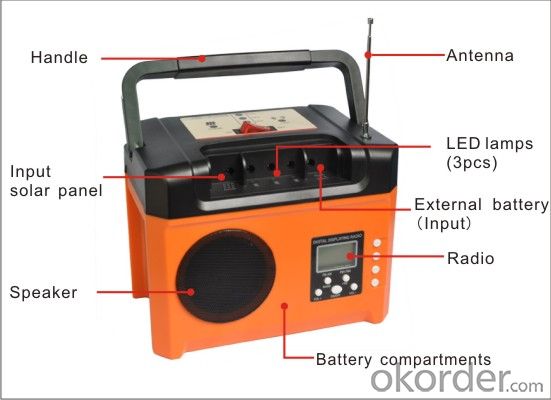
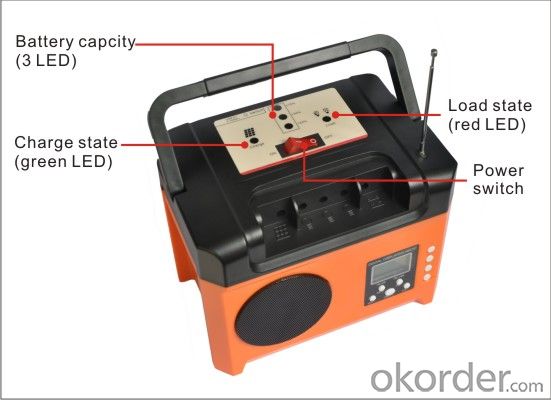
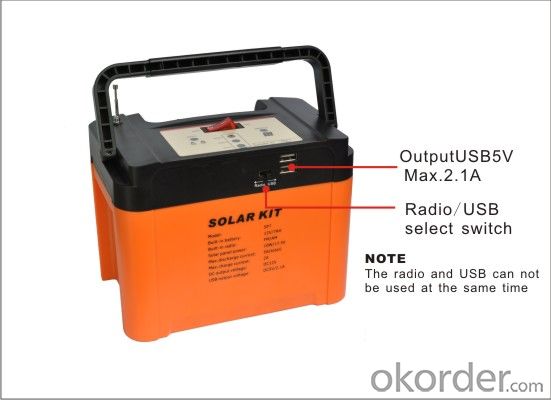
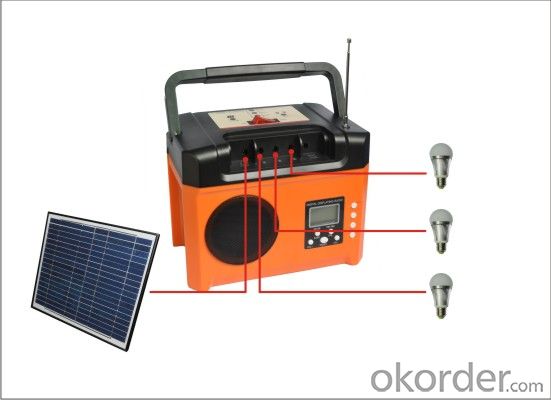
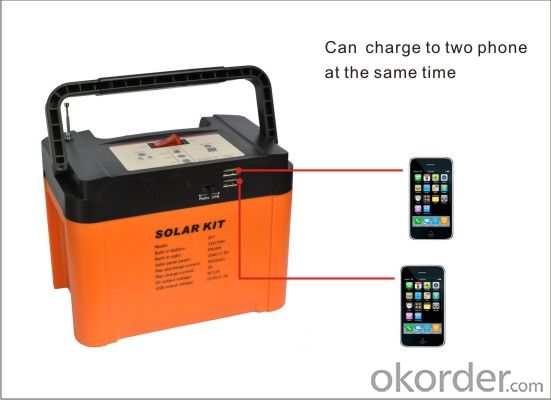
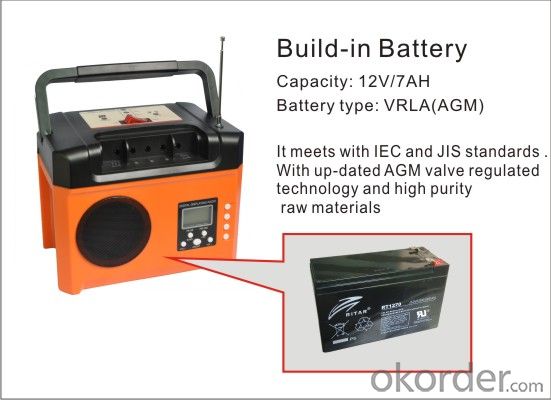
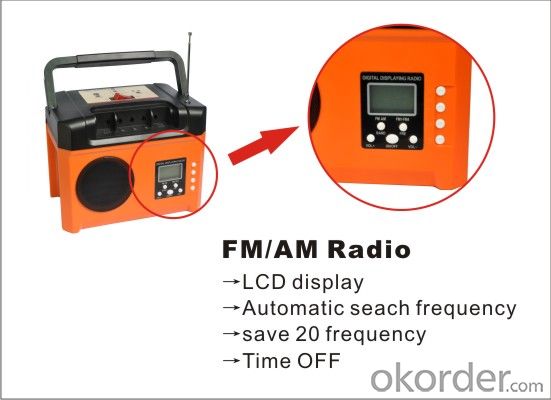
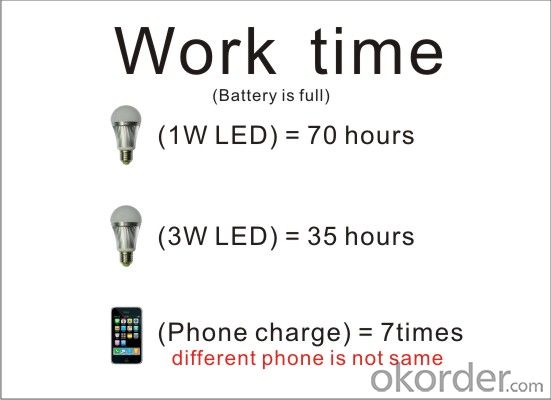
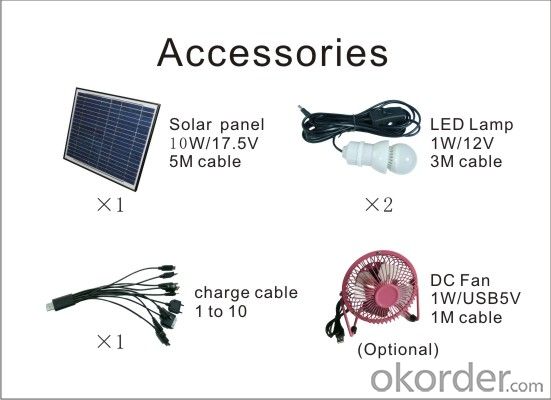
This system designed to provide DC power supply for power lighting,mobile phone charging,run the DC Fan and Radio,etc
Built-in maintenance-free Lead-acid battery
Build-in FM/AM Radio
Adopt the latest PWM Control modulation,real time display of battery capacity and load status.
With several output socket,can output voltage DC 12V and DC 5V at the same time.
It can charged by solar panel
Voice warning and together LED indicator shows the battery get low.
Bulit-in battery capacity:12V/7AH
Solar panel power:10W/17.5V
Max.discharge current(total):5A
Max.charge current:2A
DC Output voltage:DC12V
Weight:2.5KG
Work temperature:-20-40
USB output voltage:DC5V/2.1A
DC socket:DC2.5mm
- Q: Can solar energy systems be used for desalination?
- Yes, solar energy systems can be used for desalination. Solar-powered desalination plants use solar energy to power the desalination process, typically through the use of solar panels or solar thermal collectors. This renewable energy source can be harnessed to convert saltwater into fresh water, making it an environmentally friendly and sustainable solution for water scarcity in coastal and arid regions.
- Q: How do I choose the right size of solar energy system for my home?
- Choosing the right size of a solar energy system for your home depends on several factors. First, consider your average electricity consumption, which can be determined by reviewing past utility bills. Then, assess the amount of sunlight your location receives throughout the year. Additionally, consider future changes in energy usage, such as adding new appliances or electric vehicles. Consulting with a solar energy professional can be helpful in determining the optimal size based on your specific needs and budget.
- Q: Can solar energy systems be used in powering outdoor signage or billboards?
- Yes, solar energy systems can be used to power outdoor signage or billboards. Solar panels can be installed on the roof or nearby structures to harness sunlight and convert it into electricity. This electricity can then be used to power the lights or digital displays of the signage or billboards, making them completely independent of the traditional power grid. Solar energy systems are particularly suitable for outdoor signage as they are often located in areas with abundant sunlight. Additionally, using solar energy helps reduce the carbon footprint associated with traditional electricity generation, making it an environmentally friendly choice.
- Q: Are there any noise or sound issues with solar energy systems?
- Solar energy systems do not typically cause noise or sound problems. Unlike fossil fuel power plants or wind turbines, solar panels do not have any components that move and create noise. They simply transform sunlight into electricity using photovoltaic cells, which is a quiet process. The only potential noise issue with solar energy systems could come from the inverters, which convert the direct current (DC) generated by the panels into alternating current (AC) for use in homes or businesses. However, modern inverters are designed to operate silently or produce minimal noise levels, often comparable to the background hum of household appliances. Consequently, noise or sound problems are generally not a concern with solar energy systems.
- Q: What are the advantages and disadvantages of small-scale solar power generation system?
- Solar power has no moving parts, is not easy to damage, simple maintenance, especially suitable for unattended use; solar power will not produce any waste, no pollution, noise pollution, no adverse effects on the environment, is the ideal clean energy; solar power system short construction period, convenient and flexible, and can according to the load or, add or reduce photovoltaic capacity, avoid waste.
- Q: Can solar energy systems be used in areas with limited access to sanitation facilities?
- Yes, solar energy systems can be used in areas with limited access to sanitation facilities. Solar energy systems can provide electricity to power sanitation facilities such as water pumps, filtration systems, and waste treatment processes, helping to improve sanitation conditions in these areas. Additionally, solar-powered systems can also be used to generate heat for water heating, further supporting sanitation practices.
- Q: Can a solar energy system be installed in an area with high pollution levels?
- Indeed, it is feasible to install a solar energy system in a region with elevated pollution levels. Though the efficiency of solar panels may be compromised by pollution, it does not impede their installation or functioning entirely. Solar panels are engineered to endure diverse environmental circumstances, including air pollution. Although pollution may diminish the sunlight that reaches the panels, advancements in solar technology have enhanced their durability and capability to operate even in suboptimal conditions. Additionally, the implementation of solar energy systems in polluted areas can assist in alleviating the environmental consequences of pollution by offering a pristine and sustainable energy source.
- Q: What is solar battery storage?
- Solar battery storage refers to the technology that allows energy generated from solar panels to be stored in batteries for later use. It is a system that captures excess electricity produced by solar panels during the day and stores it in batteries, instead of sending it back to the grid. This stored energy can then be utilized during times when the solar panels are not producing enough electricity, such as at night or during cloudy days. Solar battery storage has several benefits. Firstly, it enables homeowners and businesses to become more self-sufficient and reduce their reliance on the traditional electrical grid. By storing excess energy, they can use it during peak demand periods or when there is a power outage, ensuring a constant and uninterrupted power supply. Additionally, solar battery storage helps optimize the use of solar energy. As solar panels often produce more electricity than what is immediately needed, the excess energy would typically be wasted or sent back to the grid. With battery storage, this excess energy can be stored and used later, maximizing the utilization of solar power and reducing the need for fossil fuel-based electricity. Furthermore, solar battery storage can also help in reducing electricity bills. By using stored energy during peak demand periods when electricity rates are higher, users can avoid paying higher prices for electricity from the grid. This can result in significant cost savings over time. Overall, solar battery storage is an innovative technology that enhances the efficiency and reliability of solar energy systems. It enables users to store excess energy for later use, reducing reliance on the grid, optimizing solar power utilization, and potentially saving money on electricity bills.
- Q: Can solar energy systems be installed on roofs?
- Yes, solar energy systems can be installed on roofs. In fact, rooftops are one of the most common locations for solar panel installations, as they offer ample space and direct access to sunlight. This allows for efficient harnessing of solar energy to generate electricity or heat water.
- Q: Can solar energy systems be used for powering off-grid eco-cities?
- Yes, solar energy systems can definitely be used to power off-grid eco-cities. Solar panels are a sustainable and renewable energy source that can efficiently generate electricity from sunlight, making them ideal for eco-friendly communities. By installing solar panels on rooftops or in open spaces, off-grid eco-cities can harness the power of the sun to meet their energy needs. Additionally, advancements in battery storage technology allow for the storing of excess solar energy, ensuring a continuous power supply even during periods of low sunlight. Overall, solar energy systems offer a viable and environmentally friendly solution for powering off-grid eco-cities.
Send your message to us
Solaron Solar Energy Systems - Solar Power System with FM Radio, Built-in Battery, and USB
- Loading Port:
- Shekou
- Payment Terms:
- TT OR LC
- Min Order Qty:
- 50 unit
- Supply Capability:
- 5000 unit/month
OKorder Service Pledge
OKorder Financial Service
Similar products
Hot products
Hot Searches
Related keywords
